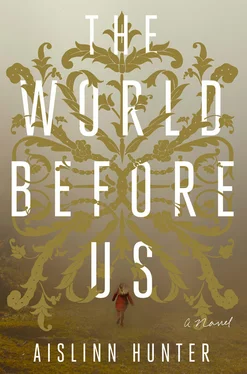The girl, according to Leeson’s later statements to Dr. Thorpe, caught up with him and Herschel in a clearing in the woods — the three of them tromping wordlessly along a muddy path and besting a modest hill before they came upon a narrow carriage track that led to town.
These are the woods of Jane’s dream and we are sometimes the figures who pass through them. We watch the dream unfold the way Jane watches a film, as if it were something we might try to press a finger against, try to pause, as if that would allow us to rest beside a nearby elm, to point down different pathways. The thing about Jane is that even though she often dreams about these woods, she gets only some of it right. This is the problem with imagination: it is prone to filling in gaps, takes what it knows from one set of experiences and sinks them into another to create some semblance of truth, bridge time.
In fact, Jane has been to that part of the country only twice, once when she was fifteen and William Eliot drove her up from London, and again when she was twenty-five and writing her MA dissertation on archival practices in rural nineteenth-century asylums. This is useful but it is not enough. When Jane imagines the north she thinks of the country freshness of the air — of honeysuckle and meadow grass — and of driving down the paved lane that led to the Whitmore, which was by then a shell of its former selves — asylum, hospital, school — empty and boarded up for decades. She doesn’t think of legs not used to walking long distances or shoes that slip, bedbug bites, paths that dissipate into thistle or bodies scoured raw from the morning bath. She doesn’t think of what it means to walk out of a door and know that you have changed the course of your life.
The door is the part of the story some of us like best. It was dull on the outside from years of weather; it was the colour of weak tea. You could run your fingers along the brace and over the stiles and not meet a splinter. It had a cast-iron lock with a small mouth meant to swallow a skeleton key. Lean close and sometimes there was the sound of the wind chattering in its teeth. And it was usually reliable: kept people and things in their proper places, made a clop-clonk sound when the mechanism was released all those times Noble unlocked it.
You might wonder what a door knows of time. About as much as we do. We know doors are meant to be passive: people come and go, move through them, think nothing of the crossing, come out somewhere expected. It is different for us; for us time is knotted. A door can open in the flare of the imagination and a century can reel across the threshold. One minute we might be with Jane in her London flat, appliances humming in the kitchen, and the next we could be back in those woods, couch grass whisking our legs.
Yes, we know there are Wheres and Whens but we have lost much of the distinction. We do not always know “after” from “before,” or either of those from “now.” We do not know our own names, or the cities or towns we came from, the cottages or houses we called home. For us there is waiting and there is sleeping and there is the dull sense that we are doing both — sleepwalking down a long hall, waking in unexpected rooms.
This is why we need Jane. Her world is fixed, measurable: she turns on her laptop and there’s a date in stern black type in the top right-hand corner of the screen; the pears she buys at the market, once composed in their bowl, convey the passage of time by the dwindling of their number and the mottling of their skin. We know that Herschel opened the Whitmore hospital door that afternoon in Yorkshire because Jane read that he did in Leeson’s asylum casebook. We know from her copy of Dr. Thorpe’s report to the Commissioners that Herschel’s outdoor privileges had, a fortnight before, been revoked. We also know that there had been a month of rain — that the fountain was clogged with a thatch of green leaves shaken loose in a storm, that there were twenty small plots of earth waiting to be turned into gardens. And we know those woods. We know that on the 2nd of August, they carried the smell of wet must and the bright tang of decay. We know this because some of us were there.
According to Leeson’s statement it took an hour of steady walking along the carriage track to reach the first junction. While he and Herschel and the girl stood to consider directions, a brougham with horses travelling at a good clip came up the road. It slowed and passed directly in front of Herschel, and hints of the city — leather and polish, a waft of snuff — cut through the mineral scent of the woods. The lone gentleman passenger tilted his top hat with the nub of his walking stick and glanced out the window, surveying the trio briefly before he tapped for the driver to hurry on.
Herschel watched the carriage depart and scratched his thigh, which was prickly from wading through some kind of nettle. He’d abandoned his trousers earlier that day on the way out of painting class because he’d dropped his brush on them and found the dash of crimson above the knee troubling. No trousers, he’d decided, was better than stained trousers, because trousers once stained would always be so even when the mark was gone. All he’d have to do was steer clear of the attendants, and he’d be at liberty to dress as sparingly as he pleased.
When the brougham was out of sight, Herschel turned to Leeson in the hope that his companion would decide on a direction and lead the way. But Leeson just stood there and stared into the distance, his dark trousers as spotless as his white-collared shirt and loose jacket, though his toe-capped shoes were muddy, as were the girl’s flat-heeled boots and the hem of her brown dress. She’d come out, Herschel suddenly realized, without a shawl, and so was standing in a slip of sun, crossing her arms and rubbing them to keep warm.
Wordlessly they decided on a path that angled east, Herschel spotting the back end of a hare flashing through the woods and following it. Their pace was slow and all three were quiet, though Herschel caw ed a few times at the sheep mulching along a ridge of heather, something he was prone to do, having once, in better times, conducted a study of local birdcall.
The girl, all of eighteen, was especially quiet, though she did say thank you in a soft voice when Leeson extended his hand to guide her over a fallen oak. He would maintain later on that he didn’t remember much of her, would only offer that she was given, throughout the afternoon, to biting her bottom lip and staring at her feet when there was cause to stop and assess a choice in direction. Leeson was caught up in his own concerns as he trod along: his knees past achy, his lungs on fire, though in the back of his mind, in the part filled with motherly advice and wifely admonishments to get outdoors, he was certain the pure air must be doing him some good. And he felt a kind of clarity, the near-joy of being unencumbered, of swinging one’s arms and breathing deeply. Words he’d once used in his life as a solicitor started to come back to him: consign, evince, bequeath . He raised his eyes to the stitch of sky between the trees and the word provision sprang to mind; he opened his palms, flexed his fingers and the word collation formed in his head; he tightened his fingers into fists, thought, Extremis .
Blinking into the leafy canopy Leeson tried to sort out what each word denoted. In a copse fragrant with meadowsweet he remembered what it meant to bequeath something: personal property, business stock, land. He conjured the countenances of old clients: the pug-face of a blacksmith willing his smithy to his nephew, signing the document Leeson had drawn up for him with such trepidation that his signature seemed to slip reluctantly out of the nib of his pen. There was also the widow from L — who had fifty acres, a woman so pale her veins gave her temples a blue hue. Words that had sometimes mired themselves in Leeson’s thinking, that had sat on his lunch plate like clumps of unrecognizable meat, suddenly attached themselves to lived circumstances. He thought, intestate, codicil , and saw an office in a dimly lit loft, a pocket watch that said it was early morning, then a drawer made of redwood that, when opened, revealed a thin stack of cream-coloured paper he’d cut into sheets himself. On the desktop there was a neat arrangement of stamps and wax, a taper on a brass holder. Just as he was about to inspect the post, his wife, Emily, appeared on the stairs to his office in her grey day dress, small pink flowers that seemed almost real stitched along her sleeve. Her smile was not as effortless as he would have liked, and there were dark circles under her eyes even though the baby had been born a month before and the doctor said Emily was fully recovered. Her pace was slow, one hand gripping the banister as she pulled herself closer. A fear rose in him, as he stood at his desk to greet her, that she was dragging a shackle behind her, that she would reach the top stair and the lead weight of the chain would snatch her backward, send her plummeting to the landing. He sensed it even then — some yoke, some umbilicus pulling her away from him. Emily lifting her chin when she reached the top step, a tendril of blonde hair dampened against her forehead as she stepped toward him, opened her arms and said, “Good afternoon, Charles.”
Читать дальше












